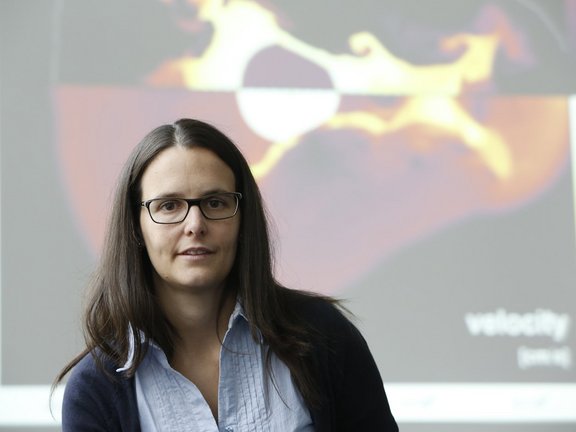The President of the Max Planck Society has appointed Prof Dr Almudena Arcones from the Technische Universität (TU) Darmstadt as a Max Planck Fellow at the Max-Planck-Institut für Kernphysik (MPIK) in Heidelberg. Within the framework of the Max Planck Fellowship, she will lead the theoretical research group "Theoretical nuclear astrophysics and the origin of heavy elements in the universe" starting 1 March 2024, working closely with the experimental department of Prof. Klaus Blaum.
One main area of Almudena Arcones' work is nucleosynthesis, the production of atomic nuclei - especially heavy ones: "I want to understand the origin and history of heavy elements in the universe. In my work, I combine astrophysical simulations for extreme high energy events, such as supernova explosions and neutron star mergers, with nucleosynthesis calculations involving the most neutron-rich nuclei." In collaboration with Prof Blaum's group, the key role of nuclear physics input for the synthesis of heavy elements will be further investigated in order to understand the extreme conditions in supernovae and neutron star mergers. "These explosive events are also sources of cosmic rays and neutrinos," emphasises Almudena Arcones and is therefore looking forward to exciting synergies with all groups at the MPIK.
Almudena Arcones studied physics at the Universidad Complutense de Madrid and obtained her Master's degree as an Erasmus student of the TU München with a thesis on neutrino physics in supernovae at the MPI für Astrophysik in Garching. In 2007, she obtained her doctorate at the TU München for her dissertation on nucleosynthesis in supernovae within the framework of an IMPRS scholarship at the MPI for Astrophysics. After postdoctoral periods at the GSI Helmholtz Centre for Heavy Ion Research and as a Feodor Lynen Postdoctoral Fellow at the University of Basel, she became the leader of a Helmholtz Young Investigator Group at the GSI Helmholtz Centre for Heavy Ion Research in 2012, combined with a junior professorship at TU Darmstadt. There, she was appointed Professor of Theoretical Astrophysics in 2016. She is a Fellow of the American Physical Society and in 2016 successfully applied for the ERC Starting Grant "EUROPIUM" for research on the origin of heavy elements.
The Max Planck Fellowship Program promotes collaboration between outstanding university lecturers and scientists from the Max Planck Society. The appointment as a Max Planck Fellow is limited to five years and is linked to the leadership of a small working group at a Max Planck Institute.
We are looking forward to a successful collaboration with Prof. Arcones!
Weblinks:
